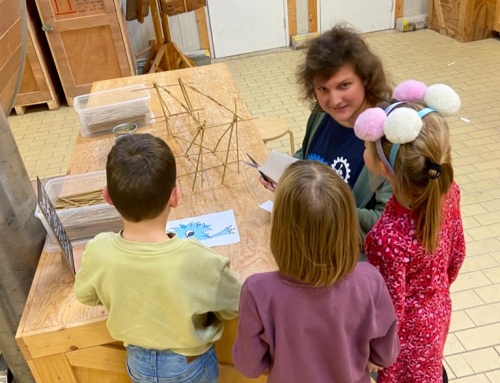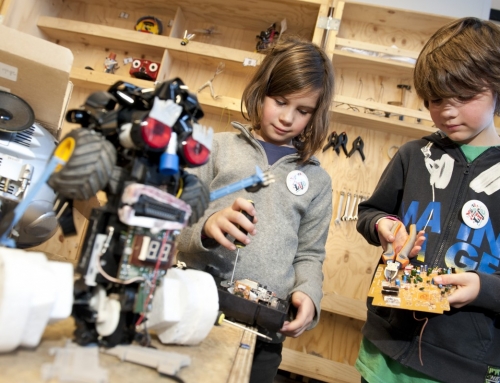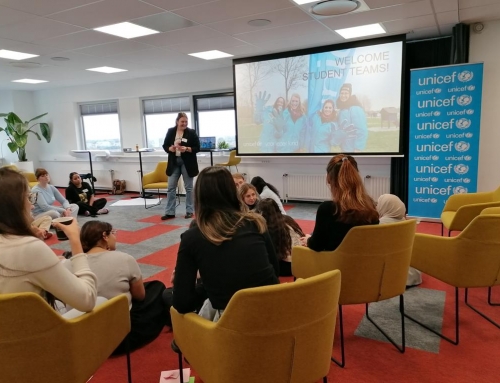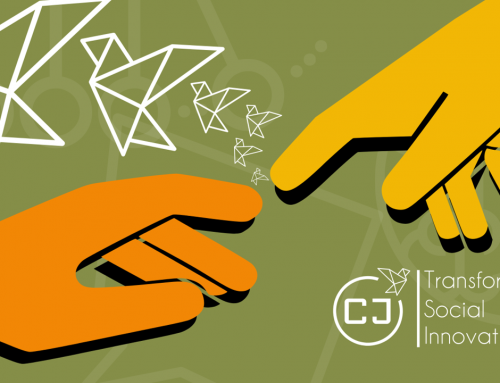The start of my journey at Social Innovation feels like a lifetime ago. Now that I have finished my graduation project, both physically and mentally, it is time to look back and reflect on the process. I want to show some of the challenges I faced during my graduation project and use that as the foundation to improve myself as a social innovator. I already elaborated on the struggles I had with interviewing children in a , but of course there were more moments that I believe are valuable to reflect on.
So why do I think reflecting is important? Well, let me answer that question by asking another question: did you know that there are 3 yous? That’s right, you are more than just one person, and you always take them with you wherever you go. There’s the past you, the present you, and the future you; and they are your best friends.
You have to be grateful and learn from past you and appreciate all that they have done. Did you do the dishes? Thank you past me! Did you go running this morning even though you did not feel like it? You’re the best younger me! Did you forget to write a blog and now you are writing one late at night while you actually want to lie in bed and sleep? I forgive you, past me, for this totally hypothetical scenario, but present me will help you out! Future me, on the other hand, you have to support as you would your best friend. Are you tired and can’t get off the couch to start working on that paper? Screw you, present me, this one is for future me! Did your alarm go off but present you wants to snooze a bit longer? Hell no, you got to get out for future you, your best friend!
Aside from the 3 yous being helpful as a reminder to appreciate and support yourself, they can also be used as a tool for reflection. I believe it is important that present me learns from past me to help out future me. With that being said, let’s do future me a solid and analyse some of the learning moments that past me experienced!
The Influence of Biases
I had some trouble performing observational research in De Uitvindfabriek. The reason is that aside from being a researcher, as I am also an employee of De Uitvindfabriek. I had to set aside my experiences and biases, and thus I wanted to stay as uninvolved as possible during the observational research. But looking back, I see that by doing so I may have missed out on gathering information on the actual experience, by not confirming my observations with the people I observed and checking if my observations matched their experiences.
I learned from that experience how a researcher’s bias can influence the research itself. Although having insider knowledge that an outsider would not be privy to was valuable, it led me to making choices that more unbiased researchers might not have made during the creation of my experience for my graduation project. I wonder, for example, if my experience as an employee caused me to overlook the fact that children do not like to read. You are probably reading this and thinking ‘yeah duh’, but for me this was such an unremarkable observation, that I did not bother to think about it or write it down in detail. As a result, I made many signs for children that explained the experiences that I made, non of which the children read. I am very glad I planned out multiple testing days for my designed experience, as it allowed me to correct my mistake and test anew.
Asking the Question: Why?
As a social innovator, I should have been more proactive in asking ‘why’ questions to management of De Uitvindfabriek. During this process, I received full support of the organisation, and everyone agreed that, for example, a vision statement would be beneficial to the company and that teaching certain skills should be more represented in the concept. It was after the creation of the Inventor Challenges, which are fun challenges that the children can do that teach them the skills De Uitvindfabriek want them to learn, that I found myself wondering: if this is so important to the organisation, why has it not been done already?
Looking back, I missed multiple of these valuable reflection moments. Management wanted to incorporate Fabrie more, a monster in De Uitvindfabriek that eats inventions and that children must find to stop him (Picture 1). However, until this graduation project nobody tried to incorporate him more. During one of my creative sessions, all participants agreed that the social media channels of De Uitvindfabriek should have been managed better, but so far nothing much has changed. By having asked the question why, I could have perhaps uncovered valuable themes that influence every aspect of decision making in the organisation. If I had to make an estimated guess with the information I have gathered, I would say that a lack of responsibility plays a big role in the company; and that De Uitvindfabriek should take the time to assign clear roles to their employees about who should manage which task. But as this is not entirely based on research, I could be mistaken, and I learned that I should be more proactive in addressing these underlying themes.
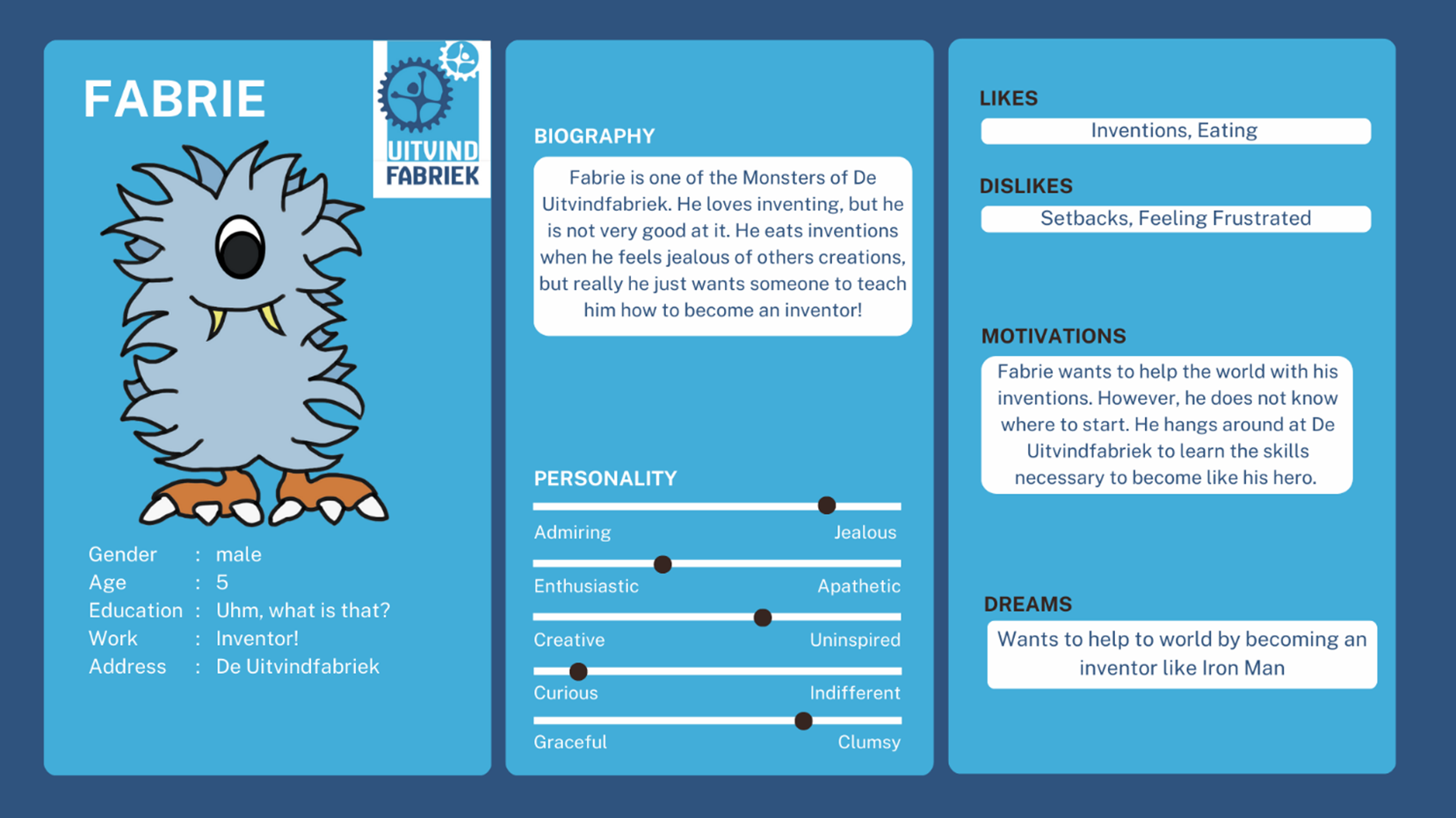
Picture 1: Fabrie Character Profile
The central research question which I stated in the blog De Uitvindfabriek: A Tech-Based Experience Centre could be reworked to better understand the core of this research. The word how in the sentence how might De Uitvindfabriek fulfil its purpose? creates a different expectation than what is actually presented in the research. The intent was to create an initiative that would help De Uitvindfabriek get closer to achieving their vision. How you can do that, is a different question altogether. In the case of this research, using the design thinking model as a constant reflection and creation tool could be the answer to that specific question. With that in mind and to adhere to the intent of the research, the central research question could be rephrased as:
What initiative could help De Uitvindfabriek to help fulfil its purpose?
Present Me: Additions to the Toolkit
When past me started Social Innovation, I possessed but two skills that are valuable for any social innovator: A proactive mindset and a desire to learn. Over the last couple of years, I learned how to design and facilitate processes, such as a co-creation session together with teachers on the integration of valuable unconventional interactive tech-related experiences within educational subjects such as math, geography, and languages. I learned how to uncover and support the creation of communities, such as with D’Houtse Kerk, a church that was scheduled to be destroyed but with the support of the townsfolk it still exists as a thriving community hub today. And of course, I learned how to design unforgettable creative experiences, such as the Inventor Challenges that teach children the skills De Uitvindfabriek wants them to posses in the future due to the development of technology, whilst entertaining them with tech-related subjects.
At the start of my Social Innovation journey, I used to make the same mistake regarding co-creation over and over. I would use a co-creative approach more to my own benefit rather than for the good of the people involved. I would first think of a concept, then co-create ideas for it, and then execute it on my own. I used co-creation as a tool for myself, rather than as an essential part of a process. Later on, I would involve people in defining the concept, but still execute the concept on my own. In the end, I had learned to take a step back, uncover together what it is that they need, and based on that co-create further. As a result, the people would want to be involved in the process because whatever is being created is something they are intrinsically motivated to use.
So, What Now Future Me?
Good question present me, now past me! There are many things I want to do now that my time at Social Innovation is coming to a close. I want to start playing the piano again, learn how to design and 3D print my own models, and plan that trip to Japan I have been sitting on for ages. Errm, maybe it’s more appropriate to talk about my future as a result of my journey throughout Social Innovation. To live is to learn, and as I hope that I have a long life ahead of me, I want to elaborate on both the skill I want to learn and the working environment that I will be employed in.
What I want to learn is to facilitate and design more from a transformative perspective. Within my graduation project for example, I only focussed on the target group of De Uitvindfabriek, as that was asked of me at the start. However, I could have zoomed out more and construct actions based on the system at large. Based on that, I could have collectively created a new starting point for De Uitvindfabriek and rephrased the challenge as a result of that.
I think it is important for me to learn how to act from a transformative perspective, based on the learning goal I set for myself in the first blog that I wrote Impact within Technology and Education, which was: ‘I want to explore what I can do as a social innovator in order to address the changing technological landscape, in order to create meaningful desired impact for the youth of today.’. Although I do believe that I achieved my learning goal, I want to go further with it in the future at De Uitvindfabriek. To quote one of my assessors of my graduation exam ‘You do the things right, but you could have asked, are we doing the right things?’. By incorporating a transformative approach, and working outside of the established boundaries, I aim to improve the impact that De Uitvindfabriek is aiming to create.

To that end, I will continue working at De Uitvindfabriek (Picture 2) to continue my development. What my exact position will be is unknown at this point in time, but the intent is for me to continue with creating initiatives that improve the impact of De Uitvindfabriek. This is a perfect place for me to develop my transformative skills, and to use the knowledge I gained in my graduation project in practice. Whatever my role will be, I know that I will continue to improve my skills and further develop my identity as a transformative social innovator.
Picture 2: De Uitvindfabriek
Appreciation
I guess it’s about time to say goodbye. My time at Social Innovation has been a wonderful one, and I am sure I will look back fondly on the experiences I have had. Thank you, past me, for all that you have done to get me here! Here’s to you, future me, to which I dedicate a lot of my efforts! Thank you, dear reader, for reading my blogs. And of course, a big thank you to all of my teachers and peers, without whom I would not be the professional I am today.

